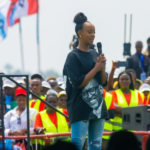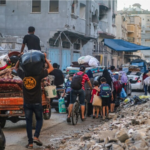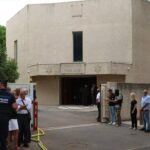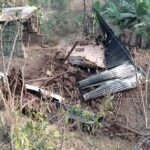Israeli Prime Minister Benjamin Netanyahu reaffirmed Thursday that Israel will intensify its military campaign against Hezbollah in Lebanon, vowing to continue strikes “with full force” until northern Israel’s residents can safely return home. Netanyahu made the statement after arriving in the U.S. ahead of his address to the United Nations General Assembly.
“We will not stop until we achieve all our objectives, foremost being the safe return of residents in the north,” Netanyahu told reporters.
Shortly before his remarks, the Israeli military announced it had killed a senior Hezbollah drone commander in an airstrike targeting an apartment building in Beirut’s suburbs. The strike left two people dead and injured 15 others, according to Lebanon’s health ministry.
Netanyahu’s commitment to the ongoing strikes comes as U.S. and European officials urge a 21-day pause in hostilities between Israel and Hezbollah to facilitate diplomatic negotiations. Despite this push, Israeli Foreign Minister Israel Katz rejected the cease-fire proposal earlier in the day, doubling down on Israel’s position.
“We will continue to fight against the Hezbollah terrorist organization with all our strength until victory,” Katz stated on social media platform X.
The proposed cease-fire, issued late Wednesday by a coalition of nations including the United States, France, and eight others, called the conflict “intolerable” and warned of the risk of wider regional escalation. The plan emphasized the need for a halt in clashes consistent with U.N. Security Council resolutions, extending to a broader cease-fire with Hamas militants in Gaza.

U.S. Defense Secretary Lloyd Austin echoed the concerns of regional escalation, warning that a full-scale war between Hezbollah and Israel would have devastating consequences. Speaking in London, Austin said a cease-fire would help lay the groundwork for broader peace efforts, including securing a cease-fire in Gaza.
Meanwhile, Israel’s military reported it had already hit 75 Hezbollah targets in southern and eastern Lebanon, with additional strikes ongoing. The Lebanese government reported that Israeli attacks near Baalbek killed 23 Syrian workers, while Lebanon’s health ministry reported a death toll exceeding 630 since the fighting began, with over 2,000 wounded.
Lebanese Prime Minister Najib Mikati has supported the proposed cease-fire, although Hezbollah has not yet issued a response. French Foreign Minister Jean-Noel Barrot is expected to travel to Beirut to facilitate diplomatic efforts.
As violence intensifies, U.N. Secretary-General Antonio Guterres issued a stern plea to all parties to “stop the killing and destruction” and “step back from the brink” of all-out war.
The conflict, which erupted following Hezbollah’s involvement in the wake of Hamas’ deadly October 7 attack on southern Israel, has claimed lives on both sides and displaced tens of thousands. With no sign of de-escalation, Israel’s military chief warned troops to prepare for a potential ground invasion of Lebanon.
In Gaza, the war between Israel and Hamas has claimed more than 41,400 Palestinian lives, including many civilians, while Israel has suffered significant losses since the conflict began.
Both Hezbollah and Hamas are designated as terrorist organizations by the U.S. and other Western countries, underscoring the complexity and high stakes of the ongoing conflicts.









